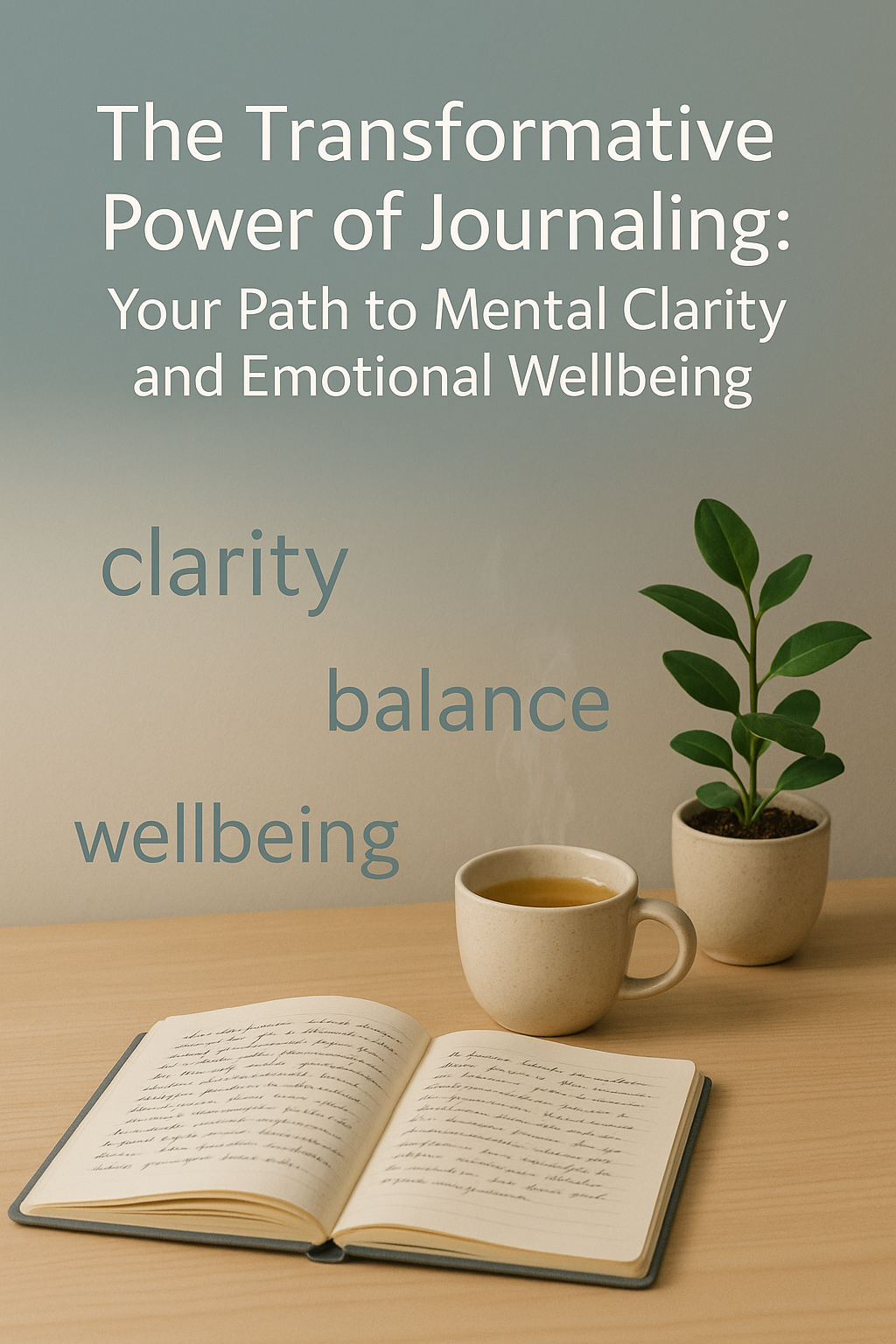The Transformative Power of Journaling: Your Path to Mental Clarity and Emotional Wellbeing
Have you ever felt stuck in your personal growth journey, wondering why even the best-laid plans for change don’t stick? As a mental health coach who struggled with anxiety and emotional regulation for years, I discovered the missing piece: the profound connection between our minds and our daily habits. Today, I want to share how a simple practice—journaling—transformed not only my relationship with my emotions but my entire approach to wellbeing.
When I first picked up a journal during a particularly challenging period of my life, I didn’t realize I was about to unlock a powerful tool that would help me overcome persistent anxiety and, more importantly, maintain emotional balance for over seven years. What started as scribbled frustrations about another day of overwhelming thoughts became my guide to understanding my deepest patterns and finally breaking free from them.
What is Journaling and Why Does It Work?
Journaling is the practice of regularly writing down your thoughts, feelings, experiences, goals, and reflections in a personal record. As research shows, a journal can include anything that “helps you,” such as ambitions, gratitude, or daily events. It’s not just about recording what happened—it’s about understanding why it matters.
The Science Behind the Power of Writing
The benefits of journaling aren’t just anecdotal. Clinical research has demonstrated remarkable physical health benefits, including improved blood pressure, lung and liver function, and even reduced doctor visits. For those of us on a mental wellness journey, studies have shown benefits for patients with anxiety, depression, PTSD, and other conditions that can complicate emotional regulation. It’s incredible to see the Transformative Power of Journaling
Who Should Start Journaling for Mental Wellness?
Journaling is beneficial for virtually anyone, regardless of age or background. However, it’s especially powerful for:
- People struggling with emotions they find difficult to share or process
- Individuals with anxiety or depression seeking non-pharmaceutical support
- Those dealing with PTSD or trauma-related emotional patterns
- People seeking personal growth and sustainable mindset changes
- Anyone wanting to improve their relationship with themselves and develop deeper self-awareness
How Journaling Transforms Your Wellness Journey
Mental Health Benefits That Support Emotional Balance
The mental health benefits of journaling directly impact your emotional wellbeing:
1. Stress and Anxiety Reduction Journaling helps declutter the mind, providing an outlet for anxious thoughts that often lead to overwhelm. By processing these emotions on paper, you’re less likely to spiral into anxious rumination.
2. Emotional Regulation Writing about feelings allows for processing emotions healthily, avoiding the harmful suppression that often manifests as outbursts or withdrawal behaviors.
3. Improved Self-Awareness Journaling encourages awareness of thought patterns, triggers, and emotions, helping you understand what drives your behavioral responses.
The Mind-Body Connection
Research has established a clear link between expressive journaling and physical health improvements. As studies demonstrate, journaling can lead to:
| Physical Benefits | Impact on Mental Wellness |
|---|---|
| Reduced inflammation | Improved mood stability |
| Better sleep quality | Enhanced cognitive function |
| Lower stress hormones | Reduced anxiety symptoms |
| Enhanced immune function | More energy for daily activities |
My Personal Journey: From Emotional Journal to Life Transformation
When I started journaling, I began with what I thought was a simple mood diary. But something magical happened—I started noticing patterns. Not just what I felt, but why. My entries evolved from “felt anxious today” to “felt anxious after a challenging work meeting where I didn’t speak up for myself.”
This shift in awareness was revolutionary. I discovered that my emotional struggles weren’t about character flaws or genetic predisposition—they were about patterns I’d never addressed. Journaling became my safe space to explore these patterns without judgment.
For an extra mindset boost try using affirmations in your journal entries, read “Unlocking the Power of Affirmations“
How to Start Your Journaling Practice for Mental Wellness
Getting Started: The Basics
Starting a journal doesn’t have to be complicated:
1. Choose Your Medium Whether it’s a paper journal, digital app, or notes on your phone—pick what feels comfortable and accessible. I started with a simple notebook, but many of my clients prefer apps for privacy and convenience.
2. Start Small Write a single sentence or focus on one topic to avoid feeling overwhelmed. Even “Today I felt…” is a perfect beginning.
3. Use Prompts or Guided Journals Structured prompts can help if you’re unsure what to write. Here are some of my favorites for mental wellness journaling:
- What emotions did I feel most strongly today?
- When did I feel most at peace versus most stressed?
- What activities brought me joy today?
- How did my body respond to different situations?
What to Journal About for Mental Wellness Success
Your journal can include various elements that support your wellness journey:
Gratitude Practice List things you are grateful for to foster positivity and reduce stress-related thought patterns.
Self-Affirmations Write positive statements about yourself to boost confidence and self-image.
Emotion and Trigger Tracking Record not just what you feel, but what events, thoughts, or interactions preceded those emotions.
Daily Reflections Explore thoughts and feelings about your day and how they influenced your choices and responses.
Goal Setting and Progress Document your aspirations and celebrate small victories along the way.
Overcoming Common Journaling Challenges
Breaking Through Mental Blocks
If you feel stuck or blocked about what to write, try these strategies:
Stream of Consciousness Writing Write whatever comes to mind without editing or structure. This can reveal surprising insights about your emotional landscape.
Use Simple Prompts Start with questions like “What am I feeling right now?” or “What made me proud today?”
Change Your Environment Sometimes a new location or different writing tool can spark creativity and honesty.
Making Journaling a Sustainable Habit
The key to successful journaling for mental wellness is consistency, not perfection. Here’s how I made it stick:
- Link it to an existing habit – I journal with my morning coffee
- Keep it accessible – My journal lives on my nightstand
- Set realistic expectations – Some days it’s a paragraph, others it’s pages
- Review regularly – Monthly reviews help me spot patterns and progress
The Mental Wellness Benefits You Can Expect
Based on my experience and that of hundreds of clients, consistent journaling can lead to:
- Better thought awareness through increased mindfulness
- Reduced emotional reactivity as you develop alternative coping strategies
- Improved decision-making driven by self-awareness rather than impulse
- Sustainable mental clarity because you address root causes, not just symptoms
- Enhanced self-compassion through regular positive self-reflection
Integrating Journaling with Other Wellness Practices
Journaling becomes even more powerful when combined with other healthy habits:
Mindfulness Practice
Use your journal to record mindfulness experiences, noting sensations, thoughts, and moments of presence.
Exercise Reflection
Document how different types of movement make you feel, both physically and emotionally.
Sleep Tracking
Note connections between sleep quality, emotional regulation, and mental clarity.
Your 30-Day Journaling Challenge
Ready to experience the transformative power of journaling? Here’s a simple 30-day challenge to get you started:
Week 1: Focus on emotions and awareness
- Daily prompt: “The strongest emotion I felt today was…”
Week 2: Explore self-compassion
- Daily prompt: “Three things I appreciate about myself today…”
Week 3: Identify patterns and triggers
- Daily prompt: “I noticed that when ___, I tend to ___”
Week 4: Set intentions and celebrate progress
- Daily prompt: “Tomorrow, I intend to…” and “Today, I’m proud that…”
Creating Your Personalized Journaling Practice
Remember, there’s no “right” way to journal. The best approach is the one you’ll actually use. Some of my clients prefer morning pages, others do evening reflections. Some write paragraphs, others use bullet points. The magic isn’t in the format—it’s in the consistency and honesty.
Beyond Mental Health: The Ripple Effect
What started as a mental wellness tool for me became so much more. Journaling improved my relationships, career satisfaction, and overall life fulfillment. When you understand yourself better, every aspect of your life benefits.
Many of my clients report similar experiences. They come for emotional regulation support but discover that journaling helps them:
- Communicate better with loved ones
- Make more confident decisions
- Handle stress more effectively
- Develop deeper self-compassion
Conclusion: Your Journey Starts with One Page
The path to sustainable mental wellness and emotional balance isn’t found in the latest self-help trend or quick-fix solution—it’s discovered in understanding yourself. Journaling offers that understanding, one page at a time.
As you embark on this journey, remember that every entry is a step toward the healthier, happier version of yourself you’re becoming. You don’t need perfect grammar, beautiful handwriting, or profound insights. You just need to start.
So grab a pen, open a notebook, and ask yourself: “How am I feeling right now?” Your transformation begins with that simple question.
Ready to start your Transformative Power of Journaling journey? Download my free “7-Day Journaling Starter Guide” and join thousands of others who have discovered the life-changing power of putting pen to paper. Your future self will thank you for starting today.
Have you tried journaling for mental wellness or emotional balance? Share your experience in the comments below, or reach out if you need support getting started. Remember, every journey begins with a single step—or in this case, a single word.






